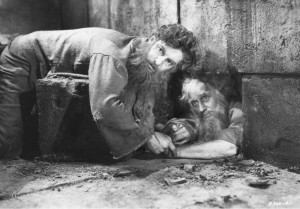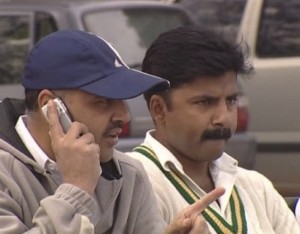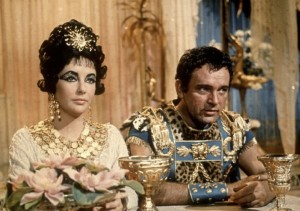One again, dear reader we bring you this stunning insight from none other than our North American Correspondent G.T Beauregard. This thrilling insight gives us a taste for how things are down down in the south, and through his acute understanding of creole dialect he has provided us with a user friendly version fit for mass consumption. Read on.
My remaining hair is not the beautiful thatch of my youth. Although it still curls, it is distinctly wispy above: the comb-over beckons.
Some years ago the bride invested in a set of electric clippers made in Sterling, Illinois, and they have served well, a tribute to the quality of American manufacture, of a generation of can-do guys who made things that worked. And they have worked for me long and without fault.

G.T, seeking advice from work colleague as to what style of haircut would be most apt. Colleague in process of installing new parcel delivery system.
But that was months ago and far away. The state of my tonsure was becoming an embarrassment. Accordingly, I visited the Dennis Barber Shop on Freret Street late on a Saturday morning to have it repaired. Passing through the blue door was entering into a secret men’s enclave: four chairs, three blue-robed gentlemen’s hairdressers and the proprietor at the far end, alone in civvies. Working the heads of local males from the ages of about 8 up, wielding clippers, scissors and combs, shortening growth that was by no means long, applying infinite care to the etching of designs with cut-throat razors, trimming beards into perfect sharpitude. At a guess I’d say there were four in the chair and a dozen waiting.

Dear reader. We must apologise for this image as it depicts a slightly older than twenty something with a mobile phone. Allegedly image taken of the New Orleans first eleven, before a limited over match. Our graphics editor has since been sacked.

G.T endures another round of ridicule from the bride. Hair improved doubtlessly with liberal quantities of Grecian 45 A.D
Apart from the 20 year old with the metal tooth and baseball cap next to me who gave sole attention to his phone, the conversation was general and open to all. The principal topic was the performance of a young running back on the TV fixed to the wall.
Then entered an older man, supporting himself on a claw-footed walking stick.
“Well hello Mister Joe, how y’all doin’? Y’all feelin’ better nah?”
“I doin’ pretty good.”
“Less tahm I seen you, y’all het one them walkers wit’ the wheels on it. You still got dat?”
“Yeh. An’ it’s got the seat on it, too.”
“So how you doin’? Y’all better nah?”
“Yeh, Ah feelin’ much better.”
“You still got yo’ car Joe?”
“Yeh, Ah’m still drivin’ mah white folks.”
“You lookin’ good, Joe, lookin’ good. How old you, Joe? You looks lahk you’s abaht thirty fahv.”
“Ah’m eighty nahn.”
“No! You cain’t be older’n abaht thirty-fahv!”
“Ah’s born April twenny-nahn, nahneen twenny six. Ah’m eighty nahn years old.”
“Man, you livin’ on borrowed tahm.”
“Nope. Ah’s livin’ on someone else’s tahm.”
I was called to the chair of Carl, well ahead of my place in the queue, it seemed to me. I rather feared that my presence was inhibiting the normal social flow. He explained, and it might be true, that the others were waiting for their particular barbers. I ordered my usual: a number three.
Carl was very obliging, and I do not question his capabilities. I do suspect that he has spent a lifetime cutting African hair, and has developed preconceptions about the direction of the grain which are not necessarily transferrable to one of my celtic heritage. Accordingly, he commenced to clip from the crown downwards where I would have worked from the bottom up. The clipping left considerably more hair attached than that to which I am accustomed. However I did not like to complain, and the subsequent trimming with comb and scissors was, I thought, quite satisfactory. The overall effect is a bit Julius Caesar, without the toga or military success of course.
The bride, on the other hand, considers it hilariously bad. So does the boy, although he didn’t own up to that until prompted by his mother. I don’t know that I shall ask the girl’s opinion. Her mind has probably been poisoned against it already.

